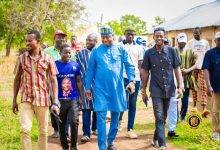Our story on the Presidential Breakfast meeting President Nana Addo Dankwa Akufo-Addo had with development partners on the second phase of the government’s flagship agriculture programme Planting for Food and Jobs (PFJ 2.0) in Accra yesterday raised issues of concern that must be addressed.
We find some of the issues intriguing as we least expected them to happen.
First, we wonder whose fault it is that there is lack of alignment of priorities between the policies of certain international development agencies and their national policies and strategies on one hand and those of Ghana on the other.
We can see the President’s distaste in this matter as he expresses the concern and appeals to international partners operating within the agriculture space to align their respective policies with those of the government.
It is good that the President is raising the issue but the question is for how long has it been a problem; what attempts have been made to resolve it; and what were the challenges that hindered resolution?
Or was it a matter of business as usual but now has been identified as causing problems in the country’s agricultural space?
We reckon that such a problem may exist in other sectors of the country’s economy and so the government must do all it can to identify such loopholes and plug them.
To us, it is also overwhelming to hear President Akufo-Addo call for action to address the unwelcome situation where neither the central government nor its agencies such as the Ministry of Finance and Ministry of Agriculture, are provided foreknowledge of some funds being employed in the country by international development agencies.
All along, our thinking was that development partners worked with relevant state agencies, so this appeal from the President sounds surprising to us.
Does it mean funds disbursed in that manner are grants, gifts or whatever which do not need government approval or even mere attention?
Were the funds given to non-governmental organisations? And even if that was the case, were the donors not concerned that should there occur some criminality, the State Ghana has to come in?
Is there any advantage for the donors to bypass state agencies and do their own thing?
Our concerns notwithstanding, we are happy these issues have come to the public domain.
They serve as sources to ask for accountability from any relevant avenue in order to fix certain problems that arise from the government’s attempts to improve the lot of the people.
The state should not allow attempts that look beneficial but inherent in them is the motive to undermine the country’s development.
We do not intend to blame anyone, yet we think the right thing must be done in the interest of the country.
With regard to the breakfast meeting itself, we believe it was a useful event, particularly because of its subject matter – agriculture.
For its nature and importance, agriculture would always raise issues such as high cost of food production and related high prices of food; disruptions in production caused, for instance, by climate change; lack of inputs like fertiliser; and disruptions in the supply chain.
Such issues need urgent attention and so events that concern agriculture must always be prioritised.



